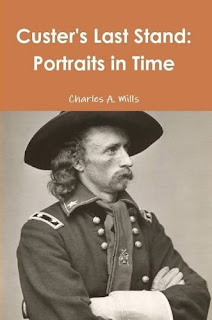"From Far
Dakota's Cañons" was first published as "A
Death Sonnet for Custer" in the New York Tribune, 10 July 1876, two
weeks after General George Armstrong Custer's death. Walt Whitman received ten
dollars for the poem.
The sonnet
later appeared as “From
Far Dakota's Cañons” in Whitman’s monumental work, Leaves of Grass.
I.
From far
Montana's cañons,
Lands of
the wild ravine, the dusky Sioux, the lone-
some stretch, the silence,
Haply,
to-day, a mournful wail—haply, a trumpet
note for heroes.
II.
The
battle-bulletin,
The
Indian ambuscade—the slaughter and environ-
ment
The
cavalry companies fighting to the last—in stern-
est, coolest, heroism.
The fall
of Custer, and all his officers and men.
III.
Continues
yet the old, old legend of our race!
The
loftiest of life upheld by death!
The
ancient banner perfectly maintained!
(O lesson
opportune—O how I welcome thee!)
As,
sitting in dark days,
Lone,
sulky, through the time's thick murk looking
in vain for light, for hope,
From
unsuspected parts, a fierce and momentary
proof,
(The sun
there at the center, though concealed,
Electric
life forever at the center,)
Breaks
forth, a lightning flash.
IV.
Thou of
sunny, flowing hair, in battle,
I
erewhile saw, with erect head, pressing ever in
front, bearing a bright sword in thy hand,
Now
ending well the splendid fever of thy deeds,
(I bring
no dirge for it or thee—I bring a glad, tri-
umphal sonnet;)
There in
the far northwest, in struggle, charge, and
saber-smite,
Desperate
and glorious—aye, in defeat most desper-
ate, most glorious,
After thy
many battles, in which, never yielding up
a gun or a color,
Leaving
behind thee a memory sweet to soldiers,
Thou
yieldest up thyself.
Custer’s Last Stand: Portraits in Time
















